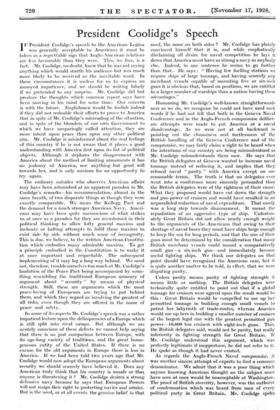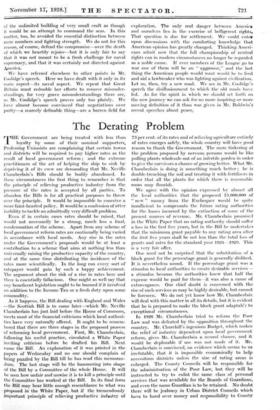President Coolidge ' s Speech IF President Coolidge's speech to the American
Legion -11- was generally acceptable to Americans it must be taken as a regrettable sign that Anglo-American relations are less favourable than they were. This, we fear, is a fact. Mr. Coolidge, no doubt, knew that he was not saying anything which would startle his audience but was much more likely to be received as the inevitable word. In these circumstances it is useless for us to express an annoyed impatience, and we should be writing falsely if we pretended to any surprise. Mr. Coolidge did but produce the thoughts which common report says have been moving in his mind for some time. Our concern is with the future. Englishmen would be foolish indeed if they did not redouble their efforts to prove to America that in spite of Mr. Coolidge's misreading of the situation, and in spite of the blunders of our own Government to which we have unsparingly called attention, they are more intent upon peace than upon any other political aim. Mr. Coolidge is misinformed about the real feelings of this country if he is not aware that it places a good understanding with America first upon its list of political objects. Although it deplores the disagreement with America about the method of limiting armaments it has no jealousy of America, nor anything but good will towards her, and is only anxious for an opportunity to try again.
The ordinary outsider who observes American affairs may have been astonished at an apparent paradox in Mr. Coolidge's remarks—his recommendation, almost in the same breath, of two disparate things as though they were exactly comparable. We mean the Kellogg Pact and the demand for a much stronger American Navy. Ameri- cans may have been quite unconscious of what strikes us at once as a paradox for they are accustomed in their political thinking to allow lofty general maxims and inchoate or halting attempts to fulfil those maxims to exist side by side without much sense of incongruity. This is due, we believe, to the written American Constitu- tion which embodies many admirable maxims. To get a principle embodied in the Constitution is to make it at once important and respectable. The subsequent implementing of it may lag a long way behind. We need not, therefore, trouble ourselves too much at Mr. Coolidge's laudation of the Peace Pact being accompanied by some- thing resembling the traditional European armoury of argument about " security " by means of physical strength. Still, these are arguments which the most peace-loving of Europeans are trying to put behind them, and which they regard as involving the greatest of all risks, even though they are offered in the name of peace and safety.
In some of its aspects Mr. Coolidge's speech was a rather impatient lecture upon the delinquencies of a Europe-which is still split into rival camps. But although we are acutely conscious of these defects we cannot help saying that there is no just comparison between Europe, with its age-long variety of traditions, and the great homo- geneous entity of the United States. If there is no excuse for the old arguments in Europe there is less in America. If we had been told two years ago that Mr. Coolidge would now adopt the European arguments about security we should scarcely have believed it. Does any American truly think that his country is unsafe or that anyone is threatening it ? Mr. Coolidge desires a strong defensive navy because he says that European Powers will not resign their right to protecting navies and armies. But is the need, or at all events the genuine belief in that need, the same on both sides ? Mr. Coolidge has plainly convinced himself that it is, and while emphatically disclaiming all desire for naval competition he lays it down that America must have as strong a navy as anybody else. Indeed, in one sentence he seems to go further than that. He says : " Having few fuelling stations we require ships of large tonnage, and having scarcely any merchant vessels capable of mounting five or six-inch guns it is obvious that, based on positions, we are entitled to a larger number of warships than a nation having these advantages."
Honouring Mr. Coolidge's well-known straightforward- ness as we do, we recognize he could not have used such words if he had not felt that both in the Geneva Naval Conference and in the Anglo-French compromise deliber- ate attempts were made to put America at a naval disadvantage. As we were not at all backward in pointing out the clumsiness and tactlessness of the British handling of the Geneva Conference and of the compromise, we may fairly claim a right to be heard when the intentions of our country are being misunderstood as Mr. Coolidge misunderstands them now. He says that the British delegates at Geneva wanted to increase naval tonnage instead of reducing it, and implies that they refused naval " parity " with America except on un- reasonable terms. The truth is that no delegates ever went into a conference more sincerely persuaded than the British delegates were of the rightness of their cause. What they proposed would have cut down the strength and gun-power of cruisers and would have resulted in an unparalleled reduction of naval expenditure. That surely was a long step towards disarmament. It meant the repudiation of an aggressive type of ship. Unfortun- ately Great Britain did not allow nearly enough weight to the arguments of the Americans that owing to their shortage of naval bases they must have ships large enough to keep the sea for long periods, and that the size of their guns must be determined by the consideration that many British merchant vessels could mount a comparatively small gun—a six-inch gun—and immediately become useful fighting ships. We think our delegates on that point should have recognized the American case, but it is quite another matter to be told, in effect, that we were disputing parity.
Unless parity means parity of fighting strength it means little or nothing. The British delegates were technically quite entitled to point out that if a global tonnage for cruisers were agreed upon the result would he this : Great Britain would be compelled to use up her permitted tonnage in building enough small vessels to patrol her labyrinth of trade-routes, whereas America would use up hers in building a smaller number of cruisers of the largest legal size with the greatest permitted gun- power-10,000 ton cruisers with eight-inch guns. .This, the British delegates said, would not be parity, but really inferiority in fighting strength for Great Britain. If Mr. Coolidge understood this argument, which was perfectly legitimate if inopportune, he did not refer to it. He spoke as though it had never existed.
As regards the Anglo-French Naval compromise, it was another sincere attempt of experts to find a common denominator; We admit that it was a poor thing which anyone knowing American thought on the subject must have seen at once would be unacceptable at Washington. The proof of British sincerity, however, was the outburst of condemnation which was heard from men of every political party in Great Britain. Mr. Coolidge spoke of the unlimited building of very small craft as though it would be an attempt to command the seas. In this matter, too, he avoided the essential distinction between mere numbers and fighting strength. We do not for this reason, of course, defend the compromise—over the death of which we heartily rejoice—but it is only fair to say that it was not meant to be a fresh challenge for naval supremacy, and that it was certainly not directed against America.
We have referred elsewhere to other points in Mr. Coolidge's ,speech. Here we have dealt with it only in its main aspect—its naval aspect. We repeat that Great Britain must redouble her efforts to remove misunder- standings, for very grave misunderstandings .there are, as Mr. Coolidge's speech proves Only too plainly. We have almost become convinced that negotiations over parity—a scarcely definable thing—are a barren field for exploration. The only real danger between America and ourselves lies in the exercise of belligerent rights. That question is due for settlement. We could enter upon discussions with the comforting knowledge that American opinion has greatly changed. Thinking Ameri- cans admit now that the full championship of neutral rights can in modern circumstances no longer be regarded as a noble cause. If ever members of the League go to war one of them will be an " aggressor," and the last thing the American people would want would be to feed and aid a lawbreaker who was fighting against civilization. Let us, then, try a new road. We see in 31r. Coolidge's speech the disillusionment to which the old roads have led. As for the spirit in which we should set forth on the new journey we can ask for no more inspiring or more moving definition of it than was given in Mr. Baldwin's recent speeches about peace,







































 Previous page
Previous page